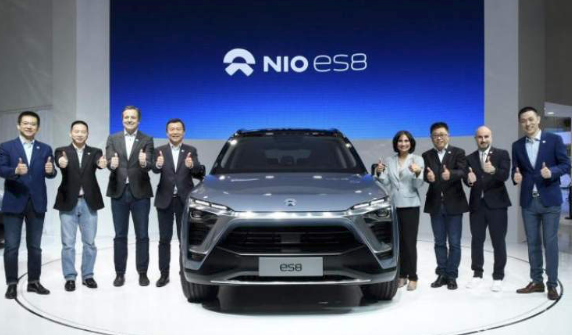Nio IPO: Chinese electric car startup Nio made its way to the stock market, raising $1 billion in its IPO  this week and market valuation at $6.42 billion; but that’s well below the $20 billion company executives had been initially hoping for. Shanghai-based Nio is targeting the premium electric-SUV segment, calling itself Tesla-competitive in its home market of China. Nio launched its first electric SUV in December, the seven-seat Nio ES8, which is priced at about half the cost of a Tesla Model X sport utility in China. Formerly known as NextEV, Nio says it will be bringing an autonomous EV to the U.S. by 2020. The ES6, an electric five-passenger SUV, is in development. Nio backers include Chinese internet giants Baidu and Tencent, as well as Chinese smartphone maker Xiaomi. Tencent also owns a small stake in Tesla stock.
this week and market valuation at $6.42 billion; but that’s well below the $20 billion company executives had been initially hoping for. Shanghai-based Nio is targeting the premium electric-SUV segment, calling itself Tesla-competitive in its home market of China. Nio launched its first electric SUV in December, the seven-seat Nio ES8, which is priced at about half the cost of a Tesla Model X sport utility in China. Formerly known as NextEV, Nio says it will be bringing an autonomous EV to the U.S. by 2020. The ES6, an electric five-passenger SUV, is in development. Nio backers include Chinese internet giants Baidu and Tencent, as well as Chinese smartphone maker Xiaomi. Tencent also owns a small stake in Tesla stock.
Tesla Inc. has been losing executives this year, with turbulence coming from the company transitioning into a mass market automaker with production of the Model 3. CEO Elon Musk’s erratic behavior has also taken its toll. Justin McAnear, vice president of worldwide finance and operation, said in a statement Wednesday that he is leaving to take the role of chief financial officer at another company. Tesla’s chief accounting officer, Dave Morton, announced his exit last week. The work pace at Tesla and the level of public attention of the company were cited as reasons for his departure. One executive, Jerome Guillen, may be able to keep pace with Musk’s intense demands. Guillen has been named president of automotive operations, and is known for being a skilled multitasker who’s been able to operate within the Tesla culture.
While President Trump’s high import tariffs have taken their toll on several industry sectors, solar power has been able to find growth and stability. Data reported on the the second quarter of 2018 showed signs of a market turnaround. Utility solar project procurement soared in Q2 2018 as component prices declined and home solar installations steadied after a 15% contraction last year, according to the latest U.S. Solar Market Insight Report from Wood Mackenzie Power & Renewables (previously known as GTM Research) and the Solar Energy Industries Association.
Volkswagen Group warned that it will be spending a lot more to meet its target for electric vehicle product launch. While the German automaker had originally estimated that 20 billion euros ($23 billion) would be going into it, CEO Herbert Diess says this will not suffice, without providing a new cost figure. The automaker needs to reduce expenses more to be able to invest in future technology and weather turbulent periods, he said. The target is huge — VW Group plans to launch 80 new EVs across its brands including Audi, Porsche, Skoda and Seat by 2025 and offer an electrified version of each of its 300 group models by 2030. “The burden for our company, such as the cost of bringing to market electric cars, will be higher than expected,” Diess said in a joint interview with labor head Bernd Osterloh in VW’s internal newsletter. “This is particularly so since some of our competitors have been making more progress.”
The International Council on Clean Transportation (ICCT) on Wednesday released its white paper analyzing the fuel efficiency of the 20 leading airlines on routes between the U.S. to Europe in 2017. Following rigorous scientific assessments, Norwegian once again rose to the top as the most fuel-efficient airline on transatlantic routes for a second time, also receiving this honor in 2015 when the ICCT released its first study.
Findings showed Norwegian, on average, achieved 44 passenger kilometers per liter, which is 33% higher than the industry average. Norwegian, flies one of the youngest fleets in the world, comprised of Boeing 787 Dreamliners, 737-800s and 737-MAXes.
Amazon continues to invest in the grocery delivery business, now expanding Whole Foods Prime Delivery to 10 additional U.S. cities. The full list of 38 cities now includes Charlotte, Las Vegas, Memphis, Nashville, New Orleans, Oklahoma City, Phoenix, Raleigh, Seattle, and Tucson. Coverage will also be expanding in New York, Los Angles and Dallas/Ft. Worth. Amazon acquired Whole Foods, known for its organic and locally-grown produce, last year for $13.7 billion.
ACT Research Co. forecasts commercial electric vehicles will make up a “significant share” of the Class 4 through Class 8 market in 2030 to 2035. Growth will be coming from U.S. truck makers, new startups, and engine manufacturer Cummins Inc. Interest is coming from fleet operators who need to reduce tailpipe emissions and reliance on diesel fuel. “They want to take it into production but it all depends on how that market votes,” ACT Research Co. Vice President Steve Tam said.



